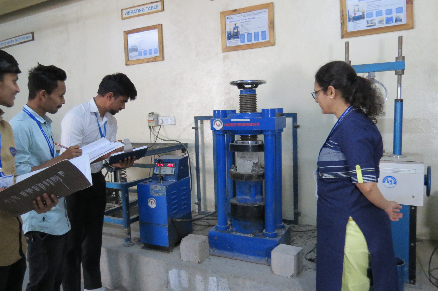Announcement
Get Ready for INDUS CUP 2K26! | Dates: 5–10 January 2026 | Stand a Chance to Win Cash Prizes up to ₹10,00,000!...Read more Get Ready for INDUS CUP 2K26! | Dates: 5–10 January 2026 | Stand a Chance to Win Cash Prizes up to ₹10,00,000!
We are excited to announce the Indus Hackathon 2025, an exhilarating one-day event organized by the CSE Department of Indus University....Read more We are excited to announce the Indus Hackathon 2025, an exhilarating one-day event organized by the CSE Department of Indus University.
26th ISTE Faculty Annual State Convention will be held at Indus University on April 27, 2023....Read more 26th ISTE Faculty Annual State Convention will be held at Indus University on April 27, 2023.
Get Ready for INDUS CUP 2K26! | Dates: 5–10 January 2026 | Stand a Chance to Win Cash Prizes up to ₹10,00,000!...Read more Get Ready for INDUS CUP 2K26! | Dates: 5–10 January 2026 | Stand a Chance to Win Cash Prizes up to ₹10,00,000!
We are excited to announce the Indus Hackathon 2025, an exhilarating one-day event organized by the CSE Department of Indus University....Read more We are excited to announce the Indus Hackathon 2025, an exhilarating one-day event organized by the CSE Department of Indus University.
26th ISTE Faculty Annual State Convention will be held at Indus University on April 27, 2023....Read more 26th ISTE Faculty Annual State Convention will be held at Indus University on April 27, 2023.


Structures' study and design are the focus of structural engineering, a subfield of Civil Engineering. Experts in this subject design structures like buildings, skyscrapers, bridges, dams, airports, and factories. A two-year master's programme in structural engineering is offered by Indus University and was created with the present demand of international construction companies. One of the distinctive features of this degree at Indus University is the studio-based teaching and learning pedagogy.
One may enroll in this highly sought-after program after earning a bachelor's degree in civil engineering. The subject of structural engineering is comprehensively taught to students throughout the two-year programmed through a variety of theory and practical workshops. Through a full year of dissertation work, the students are also given guidance for future research and start-up activities.
25% of the sanctioned strength of Management & NRI quota will be filled up on the basis of merit as per the eligibility criteria decided by AICTE & Gujarat State Government and procedure laid down by ACPC.
The eligibility criteria are a minimum of 50% marks in B.E./B.Tech with the qualifying GATE Score or State level entrance exam for M.E./M.Tech
Course Duration
2 Years (4 Semesters)
Intake
18 Seats
Lab for Material Testing
For high-quality buildings, testing and inspection of construction materials are essential. Students can examine a variety of building materials' qualities in the Material Testing Laboratory, including fresh and hardened concrete, cement, aggregates, bricks, and AAC blocks.
Laboratory for Soil Mechanics and Foundation Engineering
The Laboratory is outfitted to carry out the important characterisation of rocks and soils, as well as a number of cutting-edge testing facilities. The goal of this section is to use cutting-edge expertise to address issues pertaining to the subsurface. It consists of the following:
-Soil mechanics, which is necessary to recognise, define, and research the mechanics of soil and rock.
-Applied soil mechanics is a field that puts behavioural science into practice.
Laboratory for Earthquake Engineering
Earthquake engineering is a branch of science that focuses on reducing seismic risk to levels that are socioeconomically acceptable in order to protect society, the natural environment, and the built environment from earthquakes. It has historically been restricted to the study of how structures and geo-structures respond to seismic loading and is therefore regarded as a subfield of both structural and geotechnical engineering.
Computational Laboratory
Multi-physics challenges, which are often the simultaneous combinations of various physical phenomena, are a common occurrence in engineering domains like Civil Engineering. The Department is outfitted with a computational laboratory with a capacity of around 60 seats and systems updated with software such as AutoCAD, Staad Pro V8i, Revit, and MS Projects to handle such issues.
Workshops, Skill development programmes
In Present world, learning provides constant challenges but is essential to expanding one's knowledge base and developing new skills. Knowledge and skill must be balanced to meet industrial standards. For interaction sessions pertaining to respective fields, workshops and expert lectures are held with expert speakers from Companies & Research Institutes as well as in-house specialists. To inform the students of the current employment prospects in many domains of information, technology, and research, such workshops are often organized. In order to help students be ready for their future employment, mock test series that aim to enhance students' aptitude and reasoning abilities and familiarize them with the format of various placement and other competitive exams are frequently organized.
Structural engineers shape our society, influencing how we live, work and engage with our surroundings. Our program focuses on equipping students with the knowledge and skills needed to analyze, design, construct, and maintain essential infrastructure. From bridges to buildings, roads to dams, our curriculum covers a wide range of topics including structural analysis, construction materials, and geotechnical engineering. With experienced faculty members and state-of-the-art facilities, students receive hands-on training and real-world experience to prepare them for successful careers in the field. Civil engineers ensure the safety and sustainability of these constructions, while Structural engineers focus on designing the load-bearing components that uphold them. Working collaboratively, they devise solutions that endure over time and contribute to progress.
Indus University has an autonomous vertical - Training & Placement Department (T & P Dept.) - that connects two vital ends: education and the industry. It exemplifies a link between schools and university constituent associations (entry-level input) and the sector (output-end at the finishing level).
The Training and Placement Department was established in 2006. It was previously affiliated with the Indus Institute of Technology & Engineering until becoming a part of the Indus University in 2012.
The Training and Placement Department is the hub for career assistance for students from all programmes and streams at the university. It provides students with overall career solutions by encouraging them to choose and pursue their ideal vocations.
25% of the sanctioned strength of Management & NRI quota will be filled up on the basis of merit as per the eligibility criteria decided by AICTE & Gujarat State Government and procedure laid down by ACPC.
The eligibility criteria are a minimum of 50% marks in B.E./B.Tech with the qualifying GATE Score or State level entrance exam for M.E./M.Tech
Course Duration
2 Years (4 Semesters)
Intake
18 Seats
Lab for Material Testing
For high-quality buildings, testing and inspection of construction materials are essential. Students can examine a variety of building materials' qualities in the Material Testing Laboratory, including fresh and hardened concrete, cement, aggregates, bricks, and AAC blocks.
Laboratory for Soil Mechanics and Foundation Engineering
The Laboratory is outfitted to carry out the important characterisation of rocks and soils, as well as a number of cutting-edge testing facilities. The goal of this section is to use cutting-edge expertise to address issues pertaining to the subsurface. It consists of the following:
-Soil mechanics, which is necessary to recognise, define, and research the mechanics of soil and rock.
-Applied soil mechanics is a field that puts behavioural science into practice.
Laboratory for Earthquake Engineering
Earthquake engineering is a branch of science that focuses on reducing seismic risk to levels that are socioeconomically acceptable in order to protect society, the natural environment, and the built environment from earthquakes. It has historically been restricted to the study of how structures and geo-structures respond to seismic loading and is therefore regarded as a subfield of both structural and geotechnical engineering.
Computational Laboratory
Multi-physics challenges, which are often the simultaneous combinations of various physical phenomena, are a common occurrence in engineering domains like Civil Engineering. The Department is outfitted with a computational laboratory with a capacity of around 60 seats and systems updated with software such as AutoCAD, Staad Pro V8i, Revit, and MS Projects to handle such issues.
Workshops, Skill development programmes
In Present world, learning provides constant challenges but is essential to expanding one's knowledge base and developing new skills. Knowledge and skill must be balanced to meet industrial standards. For interaction sessions pertaining to respective fields, workshops and expert lectures are held with expert speakers from Companies & Research Institutes as well as in-house specialists. To inform the students of the current employment prospects in many domains of information, technology, and research, such workshops are often organized. In order to help students be ready for their future employment, mock test series that aim to enhance students' aptitude and reasoning abilities and familiarize them with the format of various placement and other competitive exams are frequently organized.
Structural engineers shape our society, influencing how we live, work and engage with our surroundings. Our program focuses on equipping students with the knowledge and skills needed to analyze, design, construct, and maintain essential infrastructure. From bridges to buildings, roads to dams, our curriculum covers a wide range of topics including structural analysis, construction materials, and geotechnical engineering. With experienced faculty members and state-of-the-art facilities, students receive hands-on training and real-world experience to prepare them for successful careers in the field. Civil engineers ensure the safety and sustainability of these constructions, while Structural engineers focus on designing the load-bearing components that uphold them. Working collaboratively, they devise solutions that endure over time and contribute to progress.
Indus University has an autonomous vertical - Training & Placement Department (T & P Dept.) - that connects two vital ends: education and the industry. It exemplifies a link between schools and university constituent associations (entry-level input) and the sector (output-end at the finishing level).
The Training and Placement Department was established in 2006. It was previously affiliated with the Indus Institute of Technology & Engineering until becoming a part of the Indus University in 2012.
The Training and Placement Department is the hub for career assistance for students from all programmes and streams at the university. It provides students with overall career solutions by encouraging them to choose and pursue their ideal vocations.
What are the requirements for M.Tech in Structural Engineering applications?
A B.Tech degree in Civil Engineering or a related field is the prerequisite.
Do M.Tech in Structural Engineering applicants have to take an entrance exam?
The most typical entrance exam for M.Tech programmes is GATE or Graduate Aptitude Test for Engineering. Other than GATE, only a few postgraduate admission exams are taken by select colleges and universities.
Which industries employ someone with an M.Tech in structural engineering?
Some of the industries where one might find employment after completing this course include construction, Civil Engineering, and architecture. Additionally, there are occupations in industries like building roads and bridges, railroads, sewage and irrigation systems, the oil and gas sector, and many more.
Is there a doctorate degree in structural engineering?
It is possible to pursue an M.Phil. or PhD in a field relevant to Civil Engineering after completing this postgraduate programme.